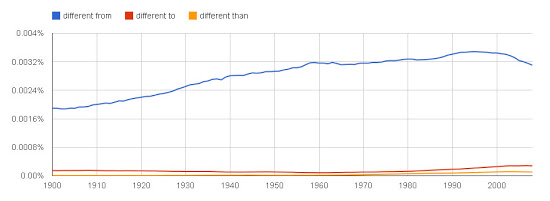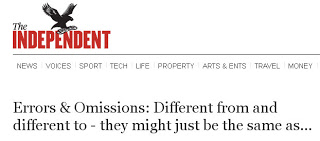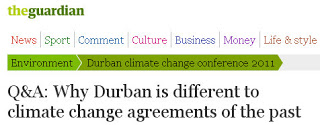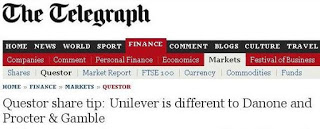Grammar






Some random thoughts on different to
If you're a foreign learner looking for advice as to what preposition to use after different, I'd recommend using from; that way you won't tread on anybody's toes. You can read more about the use of different and easily confusable words such as other and next here. That advice, however, turns out to be more of a case of 'do what the teacher says' rather than what the teacher does.
This post brings together information from dictionaries and usage guides, a few statistics, as well as examples from the press and a few books. There are also some links to linguistics books that discuss the question.
If you'd asked me a year ago what preposition follows different, I'd have no doubt said from without a moment's thought. But last year I posted a comment on the language blog Pain in the English:
I think the position of the subjunctive is very different in British English to that in American English
And was answered with:
Tsk tsk - "Different from" laddie!!
It turns out that in fact I often say different to rather than different from. Somewhat miffed at apparently being caught out making a mistake, I decided to investigate, first stop the Oxford Advanced Learner's Dictionary, my old favourite:
different (from/to/than somebody/something)
English is significantly different from British English.
(British English) It's very different to what I'm used to.
(North American English) He saw he was no different than anybody else.
So it looked as though I was OK, but I needed some more reassurance, so I checked a couple of usage guides. First, Robert Burchfield in New Fowler's
The commonly expressed view that different should only be followed by from and never by to or than is not supportable in the face of present evidence or of logic, though the distribution of the constructions is not straightforward.
And what about Fowler himself? In The King's English, published in 1908, Fowler wrote:
There is no essential reason whatever [different] should not be as well followed by to as by from. But different to is regarded by many newspaper editors and others in authority as a solecism, and is therefore better avoided by those to whom the approval of such authorities is important.
The King's English
By the time he published A Dictionary of Modern English Usage (one of the most influential usage guides to British English) in 1926, Fowler was much more strident:
That different can only be followed by from and not to is a superstition. Not only is it to be 'found in writers of all ages' (OED); the principle on which ot is rejected (You do not say differ from; therefore you cannot say different from) involves a hasty and ill-defined generalization.
Then I checked with Michael Swan's Practical English Usage:
From is generally used after different; many British people use to. In American English, than is common. American football is very different from/to soccer
A pattern seemed to be emerging. Finally, I found this in a section called Better Writing at Oxford Dictionaries:
Is there any difference between the expressions different from, different than, and different to? Is one of the three ‘more correct’ than the others?
In practice, different from is by far the most common of the three, in both British and American English. Different than is mainly used in American English. Different to is much more common in British English than American English.
Some people criticize different than as incorrect but there’s no real justification for this view. There’s little difference in sense between the three expressions, and all of them are used by respected writers.
Oxford Dictionaries
And in a usage note under the entry for different, they say:
Different to is common in Britain, but is disliked by traditionalists. The argument against it is based on the relation of different to differ, which is used with from; but this is a flawed argument which is contradicted by other pairs of words such as accord (with) and according (to).
The story so far
It's clear that different from is the most common form on both sides of the Atlantic, but that different to is quite often used in Britain, although its use in North America is very rare, according to the Merriam-Webster Dictionary of English Usage. Meanwhile different than is used quite often in North America, and to a lesser extent in Britain.
While most dictionaries list all three forms without much comment or approvingly, and the major usage guides seem to find all of them perfectly justified, there are a lot of people out there who for some reason think that different to and different than are wrong.
Being British, my main concern here is with different to. My main aim here is to show that the use of different to is perfectly standard and respectable in British English.
Some statistics
As this graph of usage in a cross-section of British books shows, different from is indeed much more common than different to and different than, at least in books:

Mark Israel at the excellent alt.usage.english website quotes these figures from the Collins Cobuild Bank of English:
| from | to | than | |
| U.K. writing | 87.6 | 10.8 | 1.5 |
| U.K. speech | 68.8 | 27.3 | 3.9 |
| U.S. writing | 92.7 | 0.3 | 7.0 |
| U.S. speech | 69.3 | 0.6 | 30.1 |
A simple search at the British National Corpus brought up similar figures
| from | to | than | |
| U.K. | 3275 | 484 | 51 |
The British Press - the qualities
Apart from the Times and the Economist, the British broadsheets (to use a rather anachronistic term) seem quite open to different to, and the difference between the from and to forms is narrower than those statistics we've just looked at would suggest.
The figures show the number of Google hits I got by doing site searches for 'different from' and 'different to' at the beginning of March 2013. Click on the links to see examples, although the figures will obviously vary a bit. In fact some seem to fluctuate quite widely day to day.
The figures for different than will be boosted by the occasional comparative, "more different than", but these don't seem to be so common as to skew the figures completely
| from | to | than | |
| The Guardian | 22,500 | 10,200 | 7,920 |
| The Independent | 14,000 | 4,160 | 478 |
| The Times | 1,060 | 568 | 47 |
| The Telegraph | 9,460 | 5,270 | 573 |
| The Financial Times | 8,670 | 2,470 | 597 |
| The Economist | 10,800 | 1,290 | 2,830 |
| The London Review of Books | 832 | 53 | 6 |
The Independent
The Independent annoyed some of its readers when it suggested that there was "nothing much wrong" with different to.

The admission last week that this column sees nothing very much wrong with "different to" has shocked the pedant community.
The Independent - Errors and Omissions - The original story
The Guardian
The Guardian seems to have a fairly relaxed attitude (at least to different to).
different from - is traditionally the correct form; different to is widely accepted nowadays ... Different than is wrong, at least in British English; and it's always differs from, not differs to
Guardian Style Guide


Explaining his apparent Damascene conversion, he told the Guardian's Sarah Boseley in October how the current situation is different to that of 30 years ago.
Guardian
The Telegraph
Strangely, the normally conservative Telegraph doesn't appear to have a problem with different to either, having the highest ratio of to to from in Google site searches.


The Economist
The Economist Style Guide brooks no nonsense
Different from, not to or than.
Economist Style Guide
But of course it also has to report what people say, so it cannot be totally to or than free, as we can see in the number of Google hits. The relatively high figure for than, no doubt reflects the fact that the Economist is more American-orientated than others.
The British Press - tabloids
| from | to | than | |
| The Daily Mail | 8,190 | 6,610 | 1,600 |
| The Daily Express | 14,200 | 3,850 | 3,560 |
| The Sun | 1,750 | 2,480 | 182 |
| The Mirror | 1,370 | 2,860 | 1980 |
The Daily Mail
It's the time of year when we all indulge in a little spot of embarrassing dancing at Christmas parties. And it seems political heavyweights David Cameron and Boris Johnson are no different to the rest of us.
Daily Mail
The Mirror
The bawdy, saucy-postcard atmosphere will be rather different to the orderly decorum of the Eton Rifles.
The Mirror
David Cameron
David Cameron seems to be quite keen on different to.

Mr Cameron said yesterday: "Syria is different to Libya."Independent
And in response to suggestions that people believed he was "Margaret Thatcher all over again", he said: "I am different to Margaret Thatcher, different to past Conservative governments ..."
BBC News
Australia
According to at least one linguistics book, Australians have a preference for different to, at least in informal spoken language, although some commentators frown on it.

Adolescents may develop ideas, values and beliefs that are different to those of their parents.
Better Health Channel, Victoria, Australia
THE Daily Telegraph journalist Steve Lewis had acted no different to any reporter "enthusiastically" chasing a story by breaking the news of sexual harassment allegations against Peter Slipper.
Herald Sun
Some examples from Google Search
The advertising in the Daily Telegraph is massively different to that you might find in a tabloid, the main adverts in the Telegraph are for expensive and upmarket ...
Winchester University
I walk round Yeadon dam with a spring in my step which is completely different to what I could manage before.
Telegraph and Argus
Official bodies
The independent examination report for a charitable company incorporated under company law is different to that of a non-company charity
The Charity Commission
Why is it that the way they are treated appears to be different to the treatment of many others, from government ministers and public officials, to the directors and employees of companies?
Judiciary of England and Wales
Google Books - examples of use
Google Book Search - different toPerhaps gentlemen are different to what they were when I was young.
E. M. Forster, A Room with a View
It just is the case that some kinds of interests and questions are different to others. Being interested in why birds migrate is different to being interested in how rocks are formed, and still more different from being interested in what makes a ...
Readings for Reflective Teaching
- Andrew Pollard
The majority of women felt they were different to other mothers in the early postpartum period and before they were ... Women's perceived feelings of being different to other mothers resulted in feelings of isolation from others and the lack of ...
Motherhood and Postnatal Depression: Narratives of Women and Their Partners ... - By Carolyn Westall
Nicholas: I don't see myself as different to other men.
One of the Children: Gay Black Men in Harlem - By William G. Hawkeswood, Alex W. Costley
Participants became aware of how their behaviour was perceived as different to the 'norm' mainly through subtle feedback: for example, a look shared between adults, or gradual rather than explicit exclusion from a social group.
Out in Psychology: Lesbian, Gay, Bisexual, Trans and Queer Perspectives - edited by Victoria Clarke, Elizabeth Peel
To answer this we need to investigate the particular characteristics of the labour market to see how it might be different to a product market such as coffee.
Labour Markets
- Geoff Hale
BROWN MUSTARD SEEDS These tiny brownish-black mustard seeds are widely used in Southern Indian cuisine and taste different to the common yellow mustard seeds of Europe
Singapore Food - Wendy Hutton
Piaget later developed the use of clinical interviews to confirm the idea that children's logic is different to that of adults
Theoretical Approaches in Psychology
The adjective alternative is often used to describe something which is different to something else but can be used instead of it.
Cambridge Advanced Learner's Dictionary
Google Books - References to different in grammars, linguistic books etc -
Prepositions following different in four corpora ... an analysis of the OED quotation base ... contains 650 cases of different from, 40 of different to, and a mere 9 of different than. While the impressionistic observers may have had some point about regional diversity in English
Twentieth Century English: History, variation and standardization
The British also use a structure sounding strange to American ears: different to. Consider this example: I found that a meadow seen against the light was an entirely different tone of green to the same meadow facing a different light
A Grammar Book for You and I--Oops, Me: All That Grammar You Need to Succeed ... - C. Edward Good
- The changing face of corpus linguistics
Some interesting statistics about the distribution of the from, to and than variants - A Handbook of Varieties of English, Volume 2 - edited by Bernd Kortmann
- Insight English Handbook - By Melanie Napthine, Robert Beardwood, Michael Pohl
- A Handbook of Varieties of English - Bernd Kortmann, Edgar W. Schneider
- Grammar Between Norm and Variation - edited by Alexandra N. Lenz, Albrecht Plewnia
- Authority in Language: Investigating Standard English - James Milroy, Lesley Milroy
- World Englishes: A Resource Book for Students - Jenifer Jenkins
Some more dictionaries
The house is different to how I expected it to be.
Different is usually followed by the preposition from. In British English, people also use to
Anne is very diferent to her younger sister.
Different is usually followed by the preposition from. In British English, people also use to
Anne is very diferent to her younger sister.
Cambridge Learner's Dictionary - CUP
American English is slightly different to British English.
Macmillan Dictionaries
Her jacket's different to mine.
Longman Dictionary of Contemporary English
In current British English, different is followed more or less equally by 'from' or 'to' - "He was, in fact, totally different from Keith" " This is very different to the ideal situation" "The next day was Christmas Eve, but it was no different to any other day except that the shop was very, very busy."
Chambers
The constructions different from, different to, and different than are all found in the works of writers of English during the past. Nowadays, however, the most widely acceptable preposition to use after different is from. Different to is common in British English, but is considered by some people to be incorrect, or less acceptable.
Collins Dictionary
Linguistics and language blogs
- Sentence First - discussion with lots of comments.
- alt.usage.english
- Separated by a Common Language
- Pain in the English
loading...
- Random Thoughts - He Was Sat, She Was Stood
Some time ago there was a rather lively discussion on the language blog, Pain in the English, about these two idiomatic expressions. Let's take a look at a couple of examples from Google Books: He was sat there with his arms over the back of...
- Try And ... Get Over It
In informal English, we often use idiomatic expressions with and instead of the infinitive marker to, when linking certain verbs with a following infinitive: Come over here and look at these lovely flowers. I'll just go and get something to...
- Finding Language In Context - Google Site Search
Let's say you've found a new word. You've looked it up in a dictionary and found an example sentence or two. Perhaps you've also found what other words it collocates with. (I'll be looking at some online tools to find collocates,...
- Can 'a Succession Of' Take A Plural Verb?
On the language website Pain in the English, in a discussion about whether it was ever posssible to use a capital letter after a colon, a commenter recently wrote: Capitalize after the colon if there are a secession of sentences following It...
- The Which-hunting Season Is Upon Us Again.
A minor spat about the use of which and that in relative clauses Which-hunting, a play on words on witch-hunting (see link below), is a term used by linguists to refer to the criticism by some of the use of which for things, in defining (aka restrictive...
